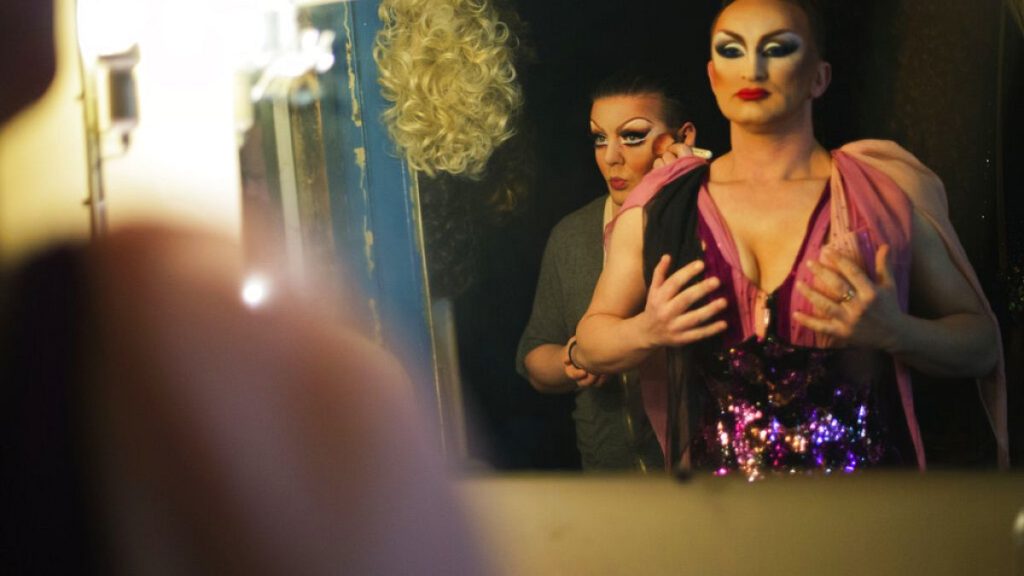In recent developments, Russian law enforcement has intensified its crackdown on LGBTQ+ communities, marked by a series of raids on bars and nightclubs in Moscow. This government action coincides with the one-year anniversary of the Supreme Court’s declaration of the LGBTQ+ movement as an “extremist organization,” an official classification that has been used to justify stringent measures against those advocating for LGBTQ+ rights. According to state media reports, authorities confiscated personal devices such as smartphones and laptops from attendees during these raids, responding to a government agenda that aims to suppress LGBTQ+ visibility and culture. Such aggressive law enforcement measures reflect the broader societal and institutional hostility toward LGBTQ+ individuals in Russia, where President Vladimir Putin has entrenched traditional family values as a fundamental tenet in his administration’s policies.
Footage from the raids revealed a disturbing scene where revelers at venues, including Moscow’s popular Arma nightclub, were commanded by police to lie on the floor during the inspections. The management of the Mono bar, another targeted location, issued a statement expressing regret over the events without directly addressing the police’s presence, indicating a climate of fear and uncertainty within the nightlife community. They emphasized the resilience of the social scene in spite of the ongoing oppression, suggesting a tentative hope that life will continue despite the governmental restrictions. The raids not only targeted clubs but also led to the detention of individuals associated with LGBTQ+ organizations and travel agencies, further demonstrating the extent to which the authorities are willing to go to dismantle networks that support or promote LGBTQ+ rights.
The actions taken by the Russian government resonate deeply with warnings voiced by activists regarding the implications of classifying the LGBTQ+ movement as an extremism threat. This designation, though not officially recognized as a formal organization, permits the authorities to act with impunity against individuals or groups associated with LGBTQ+ advocacy. The term “extremist” has historically been used in Russia to silence dissent and marginalize various communities, and the LGBTQ+ population has become a particularly vulnerable target under this legal framework. Consequently, such crackdowns elevate the risk for individuals expressing non-conforming gender identities or sexual orientations, leading to increased surveillance and arrests.
Legislative measures surrounding LGBTQ+ rights in Russia have also escalated, with recent laws having a profound impact on marginalized communities. President Putin endorsed a bill that forbids the adoption of Russian minors by citizens from countries where gender-affirming care is legal. This step not only limits the potential for international adoption but also underscores the administration’s opposition to global advancements in LGBTQ+ rights. In conjunction with this law, the Kremlin has enacted additional regulations outlawing any forms of communication that might promote alternatives to conventional family structures, effectively criminalizing discussions around LGBTQ+ identities and lifestyles.
Under this oppressive environment, individuals advocating for LGBTQ+ rights face growing scrutiny and potential legal repercussions. The culmination of anti-LGBTQ+ sentiments within the Russian political landscape has bred a culture of fear, making it increasingly difficult for activists to operate openly and for community organizations to function effectively. In addition to the targeted raids, the pervasive influence of state-controlled narratives further entrenches societal stigma against LGBTQ+ individuals, creating an atmosphere where expressing one’s identity can lead to alienation and violence. As such events unfold, the intersection of public policy and personal liberties remains a crucial battleground for human rights within the country.
In summary, the Russian government’s warfare against the LGBTQ+ movement highlights a deep-seated malaise in political and social attitudes, exacerbated by recently enacted laws and police actions targeting perceived threats to “traditional values.” The conflict is reflective of broader global discourses surrounding human rights, identity, and state authority, drawing a stark line between the ideals of freedom and the realities of life for LGBTQ+ individuals in Russia. As activists strive to combat this rising tide of oppression, the resilience of community spaces, as shown by venue management, serves as a powerful reminder of the ongoing struggle for dignity and inclusivity amidst systematic efforts to erase LGBTQ+ identities from public discourse and life. This situation calls into question the paths forward for advocacy and support in a climate of hostility and underscores the urgent need for solidarity both locally and internationally.

